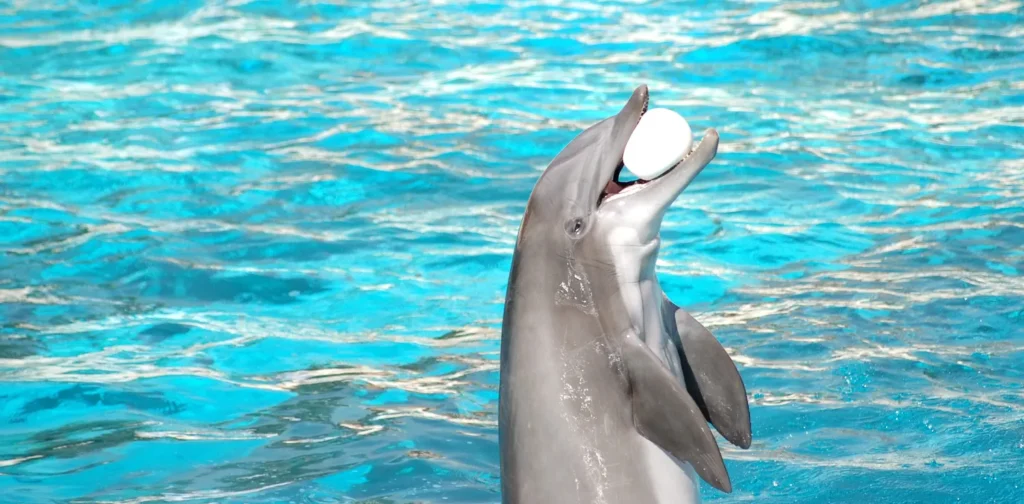How Umah Lumba Rescues and Rehabilitates Circus Dolphins

Photo: Bedneyimages on Freepik.
Every living being has the right to live a free and prosperous life. However, many animals remain trapped and exploited, such as dolphins in circus performances. In this light, Umah Lumba in Indonesia offers a rehabilitation facility to rescue dolphins from traveling circuses, help with recovery, and eventually release them back into their natural habitat.
Animal Rights and Welfare
Animal welfare is the condition where animals are comfortable, healthy, well-nourished, and safe. It also means that animals should be able to express their natural behavior without restrictions and should not suffer from pain, fear, and distress. In many cases, animals’ welfare is tied to how people treat and protect them, especially for animals in conservation institutions and pets.
Unfortunately, many conservation institutions in Indonesia still neglect animal welfare and even engage in exploitation, often due to a limited understanding of animal rights as well as weak supervision and law enforcement. Dolphins are among the animals that commonly suffer under these conditions. They are often taken from the open sea and forced to ‘work’ for traveling circuses.
A study revealed that dolphins caught in the open sea are usually locked in small swimming pools and trained for the circus. Once trained, they will be forced to perform in the circus for entertainment. They are transported improperly from one venue to another, often in a dry state without enough water to breathe. Worse, their teeth are often forcibly cut under the pretext of preventing accidents during visitor photo sessions.
Umah Lumba: Rehabilitation, Release, and Retirement of Circus Dolphins
In response to these exploitative practices, Umah Lumba aims to help rescue, rehabilitate, and release traveling circus dolphins back into their natural habitat. Located in Banyuwedang Bay, Bali, Umah Lumba was previously a circus venue. It has now transformed into a rehabilitation center that aims to help save the dolphin population.
This initiative was initiated by the Bali Natural Resource Conservation Center and the Bali Forestry Service in collaboration with the Jakarta Animal Aid Network and the Dolphin Project. The name “Umah Lumba” itself comes from the Balinese language, meaning “home of dolphins.”
Umah Lumba is designed to rehabilitate dolphins who are taken from captivity, stranded, or injured. Umah Lumba’s initiators also actively rescue dolphins who are still ‘employed’ by traveling circuses in several places. Dolphins deemed fit for release are taken to the Camp Lumba-Lumba Rehabilitation and Release Center in Karimunjawa, a permanent facility dedicated to dolphin rehabilitation and release. The sea mammals are then prepared to return to their home.
Karimunjawa was specifically chosen because most of the dolphins are captured in the Karimunjawa National Park. Releasing them there would provide them an opportunity to reunite with their family groups. Johnny, Rocky, and Rambo are dolphins who have completed the rehabilitation process and have been successfully released.
Meanwhile, dolphins considered unfit for release are placed in healing enclosures by Umah Lumba Center, where they are supported to live as naturally and independently as possible under the supervision of the Ministry of Environment.
Wildlife Protection
Ultimately, wildlife protection must be a priority in biodiversity conservation efforts. Wildlife has the right to live in its natural habitat without disturbance or ecosystem damage. We all have a responsibility to ensure that wildlife is protected by implementing strong policies, raising awareness, and developing sustainable conservation efforts to maintain the balance of nature.
Translator: Kresentia Madina
The original version of this article is published in Indonesian at Green Network Asia – Indonesia.

Co-create positive impact for people and the planet.
Amidst today’s increasingly complex global challenges, equipping yourself, team, and communities with interdisciplinary and cross-sectoral insights on sustainability-related issues and sustainable development is no longer optional — it is a strategic necessity to stay ahead and stay relevant.


 Strengthening Resilience amid Growing Dependence on Space Infrastructure
Strengthening Resilience amid Growing Dependence on Space Infrastructure  Indian Gig Workers Push Back Against 10-Minute Delivery Service Strain
Indian Gig Workers Push Back Against 10-Minute Delivery Service Strain  Call for Governance: Grassroots Initiatives Look to Scale Efforts to Conserve Depleting Groundwater
Call for Governance: Grassroots Initiatives Look to Scale Efforts to Conserve Depleting Groundwater  Integrating Environment, Climate Change, and Sustainability Issues into Education Systems
Integrating Environment, Climate Change, and Sustainability Issues into Education Systems  Finally Enforced: Understanding the UN High Seas Treaty
Finally Enforced: Understanding the UN High Seas Treaty  Risks and Opportunities of Submarine Communication Cables for Sustainable Development
Risks and Opportunities of Submarine Communication Cables for Sustainable Development